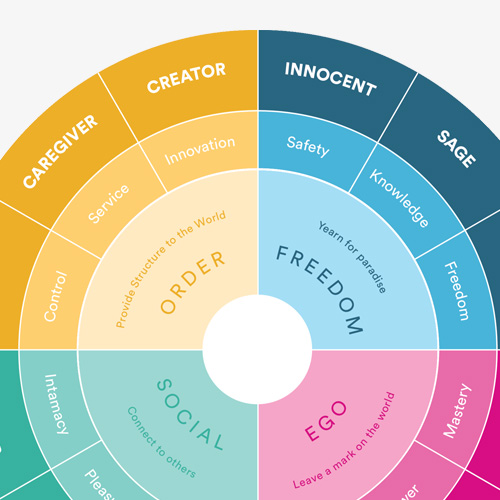
As a business owner, you want to make sure you are using every tool available to create a strong and unique brand identity. One powerful tool to consider is brand archetypes.
Brand archetypes are universal, culture-transcendent symbols that have been present in storytelling across cultures and generations. They are deep-rooted character types that are automatically recognizable and instinctively understood by people.
Using brand archetypes can aid in creating a cohesive and recognizable brand strategy. By tapping into universally recognized character types, businesses can connect with their target audience in a more meaningful way. This connection can create an emotional and psychological resonance with customers that transcend the simple selling of a product or service.
There are twelve common brand archetypes that businesses can explore and utilize for their brand identity:
- The Innocent: a brand that provides simplicity, nostalgia, and optimism.
- The Explorer: a brand that represents a desire for new experiences and adventure.
- The Sage: a brand that embodies wisdom, knowledge, and critical thinking.
- The Hero: a brand that represents the values of bravery, courage, and power.
- The Outlaw: a brand that embodies rebellion, transgression, and independence.
- The Magician: a brand that represents transformation, miracles, and enchantment.
- The Regular Guy/Girl: a brand that celebrates the normal and the mundane.
- The Lover: a brand that represents passion, romance, and sensuality.
- The Jester: a brand that embodies humor, fun, and playfulness.
- The Caregiver: a brand that represents compassion, empathy, and kindness.
- The Creator: a brand that embodies innovation, creativity, and imagination.
- The Ruler: a brand that represents control, power, and authority.
To determine which archetype best suits a brand, businesses can ask themselves questions about their brand’s personality, values, and goals. They can then use the archetype as a guide in creating a cohesive and recognizable brand experience.
Ultimately, utilizing brand archetypes can be a powerful tool in shaping the way customers interact with a brand. By tapping into universal symbols and character types, businesses can create a deeper and more meaningful relationship with their audience, and better communicate their values and purpose.

Negative Advertising: Brands In Attack Mode
Most often, advertisers put a positive foot forward. They spend their marketing dollars extolling the positive attributes of their brands

Mission Statements: Oh, for an Ounce of Inspiration
“We choose to go to the moon.” On September 12, 1962, President John F. Kennedy spoke six words that gave

Where’s Your Arena?: Looking For ROI In All The Wrong Places
On Union Square in the bustling metropolis of Manhattan, there’s an escalator that takes you up from the subway platform
